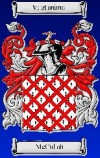McCulloh Coat of Arms
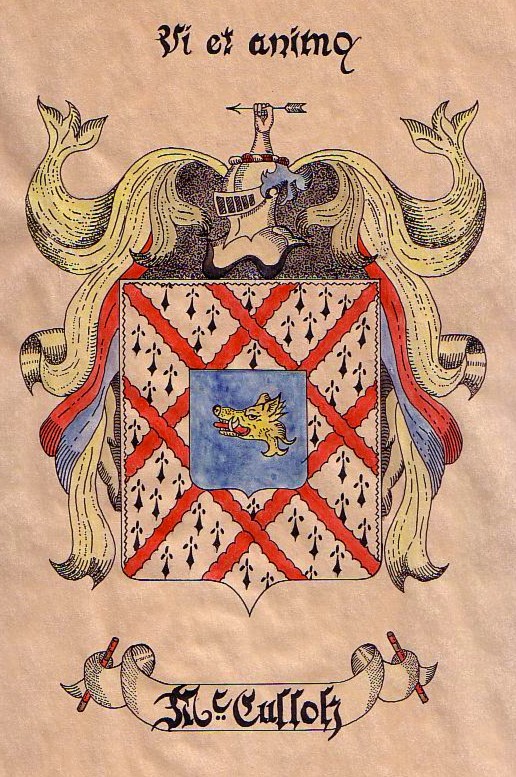
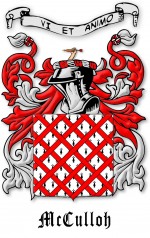
But, I have also learned a little more about heraldry in general and have found that, although this image may indeed have been one of our ancestor’s coat-of-arms, there is really no such thing as a McCulloh coat-of-arms in a general sense and no way at present for us to know whether this image is one of our direct ancestors designs.
Originally coats-of-arms were used by medieval knights to make their armor and shield stand out in battles or tournaments and to enable quick recognition by allies or spectators. The designs were used to decorate clothing worn over the knight’s armor; thus the term “coat of arms.” In addition to being painted on the shield, elements of a knight’s coat of arms were used to decorate the helmet crest, pavilion, and banners used by knights and lords.
In Scottish heraldic traditions, an individual (rather than a family) possesses a coat of arms. Coats of arms are passed from father to son as legal property, and are not used by more than a single individual at the same time (other than the eldest son and his eldest son both of whom would differentiate with a label). Other children in these families may only use a form of their father’s arms that are “differenced” with a change to a color or addition of a distinguishing symbol or design once they obtain specific approval. In Scotland the Lord Lyon has criminal jurisdiction to enforce the laws of arms. Here in the United States of America, there are no laws governing the use of heraldic symbols.
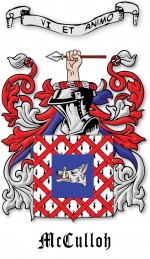
Legend surrounding the McCulloh name says that in the time of the Crusades, a Scottish warrior carrying on his shield a boar was conspicuous for his prowess and personal daring in the Holy Land. On his return, William the Lion, in recognition of his prowess, granted him the lands of Myrton, Glasserton and Auchtnaught. Boar in Gaelic, the old Galloway tongue, is cullach. The soldier adopted as his patronymic the word Cullach; his son would have been called MacCullach.
Many unrelated families share the same surname. Strictly speaking, any individual’s claim to use a specific historical coat of arms rests on a family link with an ancestor known to have used those arms. Sharing a surname does not mean that you share the right to the same arms. A fairly small fraction of society ever actually bore arms and used coats of arms at any time. Although arms were used throughout the social scale, it was much more likely at the top than at the bottom. Most Americans are descended from lower-class immigrants. (This is certainly true of our branch of the McCullohs.) Statistically, then, the chance that a direct ancestor of ours bore arms is not very high. And, since we are of Scottish descent the Scottish heraldic authority would require a well-documented pedigree, probably stretching over several centuries, if we actually wished to matriculate arms.
So, although we can not, in a truly technical sense, claim this design as our historic coat of arms, we are certainly free in this country to display and use this or any heraldic design as we see fit.
First, as noted above, the crusader knight’s shield had the image of a boar. And you will notice that the McCulloh coat of arms contains a boar’s heads on the shield. The Celtic meaning of a boar’s head symbol is “endurance and courage”. This matches nicely with the second feature of note; the motto Vi et animo which means “By Strength and Courage.”
Have you studied the McCulloh coat of arms? Do you have additional information you would like to share on its symbols and meanings? If so, please share them with us and we will add your comments to this article.
CREST BADGE
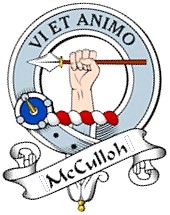
A Scottish crest badge is a heraldic badge worn to show allegiance to an individual or membership in a specific Scottish clan. Crest badges are commonly called clan crests, but this is a misnomer; there is no such thing as a collective clan crest, just as there is no such thing as a clan coat of arms.
Crest badges consist of a crest and a motto/slogan. Crest badges are commonly worn by members of Scottish clans. These badges usually consist of elements from the clan chief’s coat of arms. Click here for a complete Wikipedia article on this subject.
Sources:
MFAQ section of www.heraldica.org – Josh Mittleman and Francois Velde
www.wikipedia.org
Clans and Families of Ireland – John Grenham; Wellfleet Press, 1993
Uncollected McCulloh Family Papers

